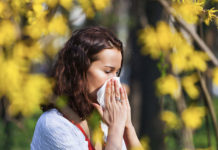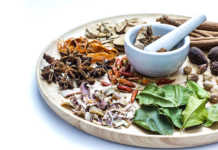
Spring is a joy for some of us. For others, it is a time of runny noses, itchy eyes and the sinus congestion of allergies and hay fever. As nature comes alive, pollens and spores become airborne, triggering a variety of unpleasant symptoms in many people.
In addition to hay fever, allergic reactions can include dermatitis, eczema, asthma, hives and anaphylaxis. These are all attempts by the body to protect itself.
BOOSTING IMMUNITY
The classic allergic reactions of itchy eyes, a runny nose and post-nasal drip are the body’s responses to a hypersensitivity or immunoglobulin E (IgE) reaction. Mast cells, specialized components of the immune system, are concentrated in the mouth, throat, nose and lungs, where they are produced in large numbers. When these specialized cells are stimulated by allergens such as pollen, they release histamine and other reactive chemicals that cause swelling and inflammation.
A really strong, healthy immune system can stop allergic reactions before they get started!
The liver and the adrenal glands are important immune supporters. The liver is responsible for detoxification. It can remove hormones, drugs and chemicals, as it filters all the blood coming from the digestive tract, and makes toxins water-soluble for excretion. The adrenal glands are also important for immune function. They release the stress hormones, such as cortisol, which plays an important role in immunity, and adrenal health can be compromised by continual physical or emotional stress.
Supplements to support the functioning of the liver – regular cleansing, milk thistle – and adrenal glands – vitamin C, vitamin B complex, astragalus, Siberian ginseng, ashwaganda and licorice root extract – can help boost the immune system.
THE FINAL SNEEZE
Our bodies are constantly bombarded by chemicals and environmental triggers. It really comes as no surprise that at times the immune system can be overwhelmed and confused by this toxic load. While some elements of environmental exposure are beyond our control, there are measures you can take to naturally combat and halt the allergic response and have the best spring yet!
MORE ALLERGY BUSTERS
Although some plants seem like the enemy, others can be allies. Decreasing histamine release is managing symptoms, rather than addressing root causes; however, it does provide relief.
> Vitamin C, vitamin E, and flavonoids such as quercetin help stabilize mast cells to decrease histamine response.
> Quercetin is the most widely distributed flavonoid in the plant world, and it effectively inhibits the allergic response.
> Omega-3 essential fatty acids can also help combat allergies. A German study found that people who ate foods high in Omega-3s, such as salmon, tuna, flaxseed oil and walnuts, had fewer allergies.
Once an allergic reaction has begun, botanical medicines can help reduce symptoms and fight further infection.
> Bromelain, found in pineapple, has anti-inflammatory effects when taken between meals (with meals it acts as a digestive enzyme).
> Eyebright strengthens the mucus membranes in the sinuses and relieves swelling and inflammation in the eyes and nasal passages.










